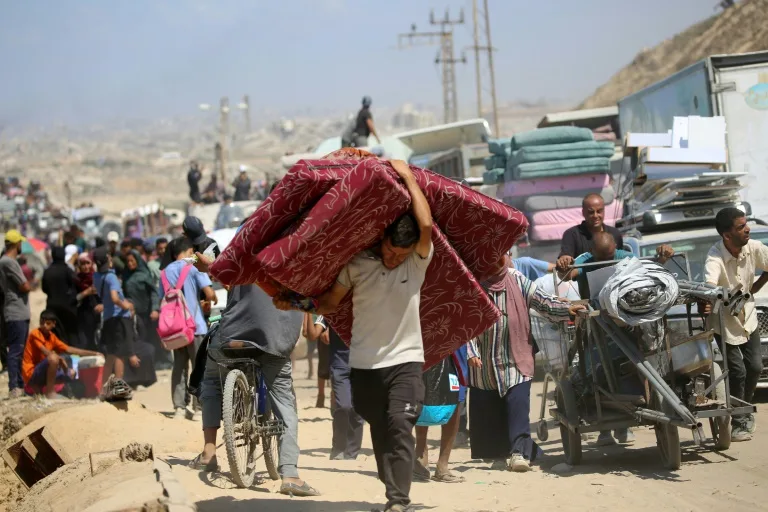News Flash

GAZA CITY, Palestinian Territories, Sept 20, 2025 (BSS/AFP) - The director of
Al Shifa hospital was on duty Saturday marshalling the facility's response to
Israel's assault on Gaza City when two victims killed in a strike were
delivered to the ward: his brother and his sister-in-law.
"I was shocked and devastated to see the bodies of my brother and his wife,"
said Mohammed Abu Salmiya, who was working in the emergency department of the
territory's main hospital at the time.
"Anything is possible now, as you receive your dearest ones as martyrs or
wounded," he told AFP. "The occupation's crimes continue, and the number of
martyrs keeps rising."
As Israel presses its new offensive to capture the territory's largest urban
centre -- despite widespread fears for the safety of both its residents and
the hostages being held by militants -- Salmiya was not the only one dealing
with loss.
An AFP journalist saw ambulances with sirens blaring pull into the hospital
compound early Saturday, bringing more bodies of people killed by Israel's
bombardment of Gaza City.
Medics unloaded four bodies wrapped in white shrouds and laid them beneath a
tree, as another ambulance arrived carrying the injured, including a boy.
'Death is more merciful' -
Gaza City has been the focus of Israel's blistering assault in recent weeks,
according to the territory's civil defence agency, a rescue force operating
under Hamas authority.
Hundreds of thousands of Palestinians have fled the city since Israel
launched its offensive, but many remain trapped, too exhausted or
impoverished to leave.
"Death is more merciful," said 38-year-old Mohammed Nassar of Gaza City's Tal
al-Hawa area, watching a steady stream of neighbours leave the area.
Families could be seen leaving with their belongings piled on trucks, cars,
donkey carts and their own shoulders.
Nassar, tired and caring for three daughters, said he lacked both the
strength and the money to evacuate, leaving him trapped in Gaza City.
"As for me, my wife and my three daughters, we will wait until the last
moment," he said.
The civil defence agency reported that at least 20 people had been killed
Saturday in strikes on Gaza City.
The Israeli military did not immediately respond to AFP requests for comment
on the overall toll or reports of the deaths of Al Shifa director Salmiya's
relatives.
"The occupation wants to forcibly displace everyone so it can destroy Gaza
City and turn it into another Beit Hanoun or Rafah -- unlivable for the next
100 years," Nassar said, referring to other parts of Gaza left in ruins by
nearly two years of war.
Israel has pummelled Gaza City with air strikes and tank fire in its bid to
seize what it describes as one of Hamas's last strongholds.
The United Nations and foreign powers, meanwhile, have urged it to abandon
its plans over fears the offensive could worsen the already dire humanitarian
situation in the city, where the UN recently declared a famine.
- 'We'll stay' -
The military launched its ground assault on the city Tuesday and has told
residents to head south, but many Palestinians say the journey is
prohibitively expensive and they do not know where to go.
Many who fled say it took them more than 12 hours to reach the southern areas
designated by the military.
Evacuation costs have also soared, according to those who left, with truck
owners charging as much as $1,500 to $2,000 for the roughly 30-kilometre (19-
mile) journey.
The civil defence agency said Friday that 450,000 Palestinians had fled Gaza
City.
The military, which has warned Gazans it will use "unprecedented force" in
the city, put the number at approximately 480,000.
The United Nations estimated at the end of August that about one million
people were living in Gaza City and its surroundings.
The military has urged Palestinians to relocate to a "humanitarian area" in
Al-Mawasi on the coast, where it says aid, medical care and humanitarian
infrastructure will be provided.
Israel first declared the area a safe zone early in the war, but has carried
out repeated strikes on it since then, saying it is targeting Hamas.
Raeda al-Amareen said she was awakened before dawn by the sound of
explosions.
"We want to evacuate but we have no money," she told AFP.
"We don't even have 10 shekels to buy bread. What are we supposed to do?
We'll stay -- either we die or someone finds a solution for us."